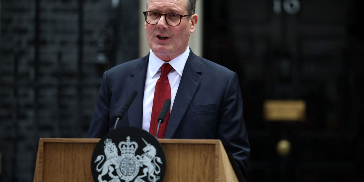The British government has announced stricter immigration policies that will prevent undocumented migrants who enter the country illegally from obtaining British citizenship.
Under the new regulations, individuals who arrive through unauthorized means, including small boat crossings, will have their applications for citizenship automatically rejected.
The UK Home Office stated that the new guidelines reinforce existing laws, ensuring that illegal entrants face strict consequences.
The move comes as Prime Minister Keir Starmer’s Labour government faces growing pressure to curb illegal migration, particularly after the far-right Reform UK party, led by Nigel Farage, secured nearly four million votes in the last general election, marking a significant political shift.
However, the new policy has sparked criticism from Labour MPs and immigration advocates.
MP Stella Creasy condemned the decision, arguing that denying a pathway to citizenship for those granted refugee status is unfair and could leave them in legal limbo.
Immigration law experts from Free Movement also criticized the policy, calling it “spiteful and damaging to integration.”
They warned that it could create a class of permanent second-tier residents, making it harder for refugees to build stable lives in the UK.
The announcement is part of a broader strategy to tighten immigration enforcement.
The government is pushing forward with the Border Security, Asylum, and Immigration Bill, which seeks to give law enforcement greater powers to dismantle human trafficking networks responsible for smuggling migrants into the UK.
Since taking office, Prime Minister Starmer has moved away from the controversial Rwanda deportation scheme introduced by former Prime Minister Rishi Sunak, instead focusing on targeting criminal gangs that facilitate illegal migration.
The debate over immigration has intensified as illegal Channel crossings continue to rise. Official figures from the UK interior ministry reveal that 36,816 people made the journey in 2024, a 25% increase from 2023.
The growing numbers have fueled political debates, with critics questioning whether the Labour government’s response is effective or merely punitive.
While the government insists that stricter rules are necessary to restore public confidence, opponents argue that the measures may unfairly penalize refugees and undermine efforts to integrate them into British society.
